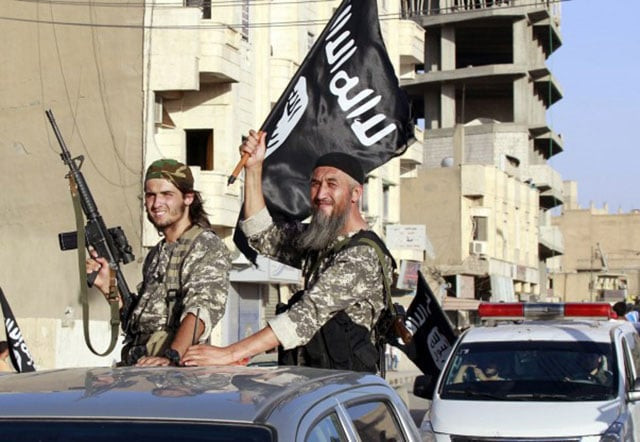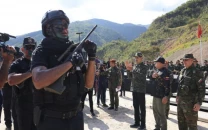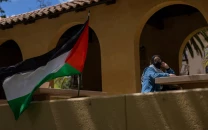Islamic State has become an existential threat to the West
Paris, Friday, November 13, 2015, has brought Europe together in an agony of anger

Paris, Friday, November 13, 2015, has brought Europe together in an agony of anger. PHOTO: REUTERS
In interviews with intelligence service people, mostly retired, for a project for the Reuters Institute, I often heard that senior British officers had thought the phrase “War on Terror” to be a stupid one, and that they never used it. It was not a war, they believed. The struggle was not “existential.” It was a serious challenge from serious militants: hard, vicious but finite.
Islamic State claims responsibility for Paris attacks
It’s different now. Francois Hollande, the Socialist president of France, has said that the slaughter in Paris last Friday evening was “an act of war.” Pope Francis, at a commemoration service for the 100,000 Italian soldiers killed in the World War One (his grandfather was one of the soldiers who survived) said that “one can speak of a third war, one fought piecemeal, with crimes, massacres, destruction.”
The Europeans aren’t being snooty anymore: Paris, Friday, November 13, 2015, has brought Europe together in an agony of anger — so much, that it is the US president who feels compelled to remind us that we should have a duty of welcome to refugees from Syria.
And there’s another switch. Vice President Joseph Biden, speaking on Monday in Los Angeles, said “I say to the American people: There is no existential threat to the United States. Nothing ISIS can do could bring down the government, could threaten the way we live.”
But the man who commanded the British armed forces from 2010 to 2013 thinks that’s mere complacency. General David Richards said at a history festival in June this year that the threat is existential and “that we need to approach this issue of Muslim extremism as we might approach World War Two back in the 1930s.” In a recent book, he’s said to have told the British prime minister that he lacked the courage to take the fight to Islamic State (IS), being too obsessed with wishing to appear liberal.
Trudeau tells Obama Canada will be 'strong' partner against Islamic State
There are three main reasons why Richards is right and Biden wrong. First, for some three decades, the nightmare of politicians and secret services has been that rogue states, and/or terrorist groups, would acquire weapons of mass destruction. It runs through “At the Center of the Storm,” the memoir of George Tenet, CIA director from 1996-2004. It kept successive presidents, from Clinton through Bush to Obama, awake at night; prompted their interventions abroad and (in Obama’s presidency) the heavy use of killer drones. It has meant that the National Security Agency (NSA) has now incomparably the largest budget of any intelligence service anywhere, so that the first “chatter” which reveals that the nightmare has real flesh can be detected.
IS might be the organisation to put flesh on that nightmare, because it has the money and can buy the expertise to make WMD. An investigation last month by the Financial Times found that in the areas of Iraq it controls, ISIS has “a sprawling operation almost akin to a state oil company that … recruits skilled workers, from engineers to trainers and managers and produces about 34,000-40,000 barrels per day. The oil is sold at the wellhead for between $20 and $45 a barrel, earning the militants an average of $1.5m a day.”
Put together money, expertise and a militant philosophy, and you have a weapon of huge destructive power, pointing at both the West and the East.
62% of Pakistanis 'don't know' how they feel about Islamic State
Second, IS is funding a large increase in its cyber warfare capability. George Osborne, the British chancellor, said on Tuesday that “ISIS’ murderous brutality has a strong digital element. At a time when so many others are using the Internet to enhance freedom and give expression to liberal values and creativity, they are using it for evil.”
Determined cyber attacks mounted by experts in cryptography could disable health and power systems, air traffic controls, nuclear power stations and much else: the human costs could quickly run into the tens of thousands, if closely coordinated.
Third, ISIS, more than any other of the militant groups, has the power to attract large numbers of young Muslims — men and women — to come to Syria and Iraq to fight with them, or to remain in the countries in which they were born and become an enemy within these states. The glamour of death, murder and “revenge” seems a powerful draw — amplified, it seems, by the hours many of the young militants spend before a screen replete with images of “Crusaders” and Jews murdering Muslims. There is thus a potentially active network of supporters in most of the Western countries, either radicalised or the future targets of radicalisation. And there is no way, outside of a locked-down authoritarian state, for all of them be monitored all the time.
The safeguards of a democratic society bounded by the rule of law place limits: a member of France’s internal secret service, the Direction Générale de la Sécurité Intérieure, told the Le Monde reporter Jacques Follorou that, “You have to prioritise, if the lads don’t commit any crime, its complicated to justify phone taps. You can’t put people on whom you have no evidence under 24-hour surveillance.”
This is not quite like any other war; nor can it be fought with previous wars’ weapons. Ranged against IS is the military might of the United States, the European states and, now, Russia. Surely, with the military and intelligence technology at their disposal, they can destroy a force which seeks to bring down 21st century civilisation and substitute for it a mediaeval theocracy?
Islamic State listed among proscribed outfits
Yet working for the theocrats is the sluggish reluctance of the liberal, consumer societies of the West to gear up for war; to surround themselves with new security systems which will inhibit travel and entertainment; to lose or reduce the liberal safeguards which have been regarded as indispensable. Working for them, too, is a hatred so pure that young men can stride among the bodies of other young men, and women, and shoot those who moved — then blow themselves up. Working for them is the lack of our comprehension about how serious they appear to be.
This, I think, adds up to war: and an existential threat. A threat to our existence, our way of life.



1726734110-0/BeFunky-collage-(10)1726734110-0-208x130.webp)















COMMENTS
Comments are moderated and generally will be posted if they are on-topic and not abusive.
For more information, please see our Comments FAQ